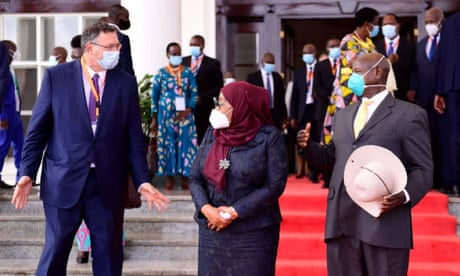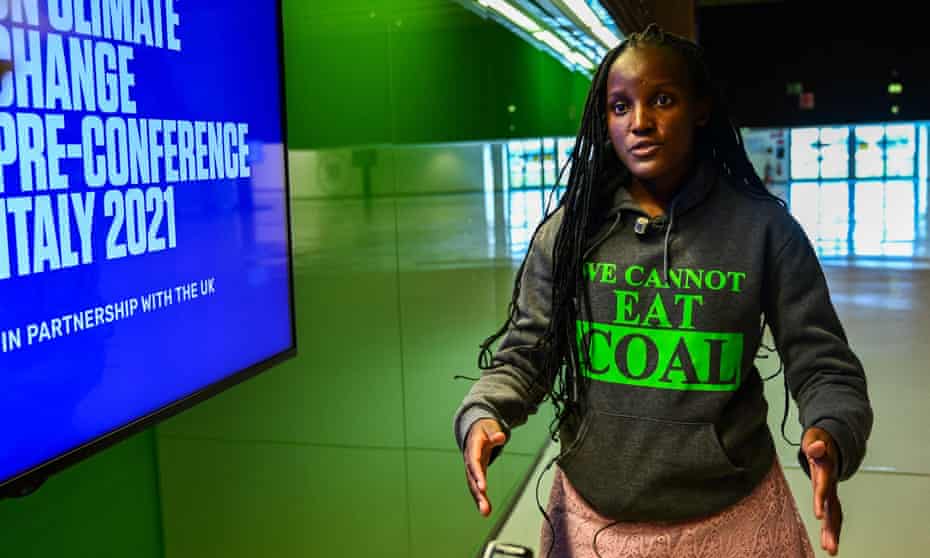Vanessa Nakate
My country, Uganda, and much of Africa has been battered by climate-related disasters. Cop26 is a chance for the biggest polluters to set up a compensation fund
Ugandan climate activist Vanessa Nakate at the Youth4Climate summit in Milan in September.
Photograph: Miguel Medina/AFP/Getty
Fri 29 Oct 2021
While walking with a friend through central Kampala last month, we saw a police truck go by, a body in the back.
It’s a sight that has become more common in Uganda. The life of that person, and many others, was taken by a heavy downpour in my home city. Uganda has been battered by floods in recent years, as well as droughts and plagues of locusts. So much has been damaged and lost here as a result of the climate crisis.
A week later I was at the Youth4Climate summit in Milan, where Greta Thunberg spoke about the “blah blah blah” rhetoric from world leaders who have promised so much but delivered so little. One pledge that sticks out for me, made in 2009, is that rich countries would send $100bn (£73bn) of climate finance each year to the most affected countries by 2020. This was meant to be just the start – a first recognition of the catastrophe inflicted on the most affected countries by the biggest historical emitters. This money was promised so countries such as mine could develop clean energy, to mitigate emissions for everyone.
But since 2009, the impacts of the climate crisis have accelerated. Africa has endured a long list of climate-related disasters – drought, flooding, landslides, famine, destruction and death – rocking all parts of our continent. Aside from the innumerable personal tragedies, the crisis is causing billions of dollars of economic damage. There is no mitigation that can undo this damage, and further harms will continue as a result of world emissions.
Protecting against future impacts is no longer enough. Climate-vulnerable countries need funds to deal with the loss and damage we are suffering now
There is no money to pay for this devastation. These areas are no longer insurable – the risk is too high. But money to repair and deal with the consequences of extreme weather has to come from somewhere.
“Loss and damage” is the term used in UN climate negotiations to refer to compensation for the most affected countries for what has been inflicted on them. For years the richest nations have blocked any progress on loss and damage at UN summits, but now it is unavoidable.
I believe in the “polluter pays” principle. A recent analysis identified the countries historically responsible for the climate crisis. We know who did this – but they don’t want to pay the bill. Rich countries providing finance only for the mitigation of our emissions and protections against future impacts is no longer enough. Climate-vulnerable countries need funds to deal with the loss and damage we are suffering now.

‘We cannot drink oil’: campaigners condemn east African pipeline project
Fossil fuel companies should also pay for the loss and damage they have caused. They have made billions of dollars in profits selling products they knew could drive humanity to existential crisis. For decades they have run lobbying campaigns to question science they knew was true, and to prevent the climate action that would have saved many lives.
A finance package for developing countries will be a central focus of Cop26 in Glasgow. But one thing is certain: we need leaders to go beyond the gesture of guaranteeing the $100bn they promised 12 years ago. They need to wake up to the scale of this crisis; a separate fund for loss and damage should be an enduring legacy of Cop26.
We have seen similar compensation pots before. Since the 1970s, the international community has required oil companies to contribute to a fund to compensate communities affected by big oil spills.
The polluters who decided to sacrifice our lives for their own profits, whether corporations or governments, should pay. Such a fund would allow us to rebuild our lives after a downpour hits and we cannot get out of the way. Such a fund would allow the most affected countries to trust in international climate diplomacy again and be a major step towards climate justice for all.
Vanessa Nakate, 24, is a climate activist and author of A Bigger Picture: My fight to bring a new African voice to the climate crisis (One Boat)


No comments:
Post a Comment